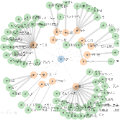Human doctors with well-structured medical knowledge can diagnose a disease merely via a few conversations with patients about symptoms. In contrast, existing knowledge-grounded dialogue systems often require a large number of dialogue instances to learn as they fail to capture the correlations between different diseases and neglect the diagnostic experience shared among them. To address this issue, we propose a more natural and practical paradigm, i.e., low-resource medical dialogue generation, which can transfer the diagnostic experience from source diseases to target ones with a handful of data for adaptation. It is capitalized on a commonsense knowledge graph to characterize the prior disease-symptom relations. Besides, we develop a Graph-Evolving Meta-Learning (GEML) framework that learns to evolve the commonsense graph for reasoning disease-symptom correlations in a new disease, which effectively alleviates the needs of a large number of dialogues. More importantly, by dynamically evolving disease-symptom graphs, GEML also well addresses the real-world challenges that the disease-symptom correlations of each disease may vary or evolve along with more diagnostic cases. Extensive experiment results on the CMDD dataset and our newly-collected Chunyu dataset testify the superiority of our approach over state-of-the-art approaches. Besides, our GEML can generate an enriched dialogue-sensitive knowledge graph in an online manner, which could benefit other tasks grounded on knowledge graph.
翻译:相比之下,现有的基于知识的对话系统往往需要大量的对话实例来学习,因为它们未能捕捉到不同疾病之间的相互关系,忽视了它们之间共同的诊断经验。为了解决这一问题,我们提出了一个更自然和实用的范例,即低资源医疗对话,这种模式可以将诊断经验从病源疾病转移到有少量适应数据的目标疾病中。它也可以利用一个普通的敏感知识图表来描述先前疾病-症状关系的特点。此外,我们开发了一个图表化的元学习(GEML)框架,以学习如何演进用于推理新疾病疾病疾病间症状相互关系的普通智能图,从而有效地缓解大量对话的需求。更重要的是,通过动态演变的疾病间歇性图表,GEML还能够解决现实世界的挑战,每一种疾病的疾病间基于特征的相互关系可能会随着更多的诊断案例而变化或演变。此外,我们开发了一个图表式的图表式图表式图表式框架,用来学习如何演化一种用于推理新疾病间疾病间症状的共振性关联性图表式图表,从而验证了我们关于新高水平的在线数据分析方法的深度实验结果。




